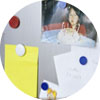|
Find your chapter

|
|
10 Warning Signs
Memory loss that disrupts daily life is not a typical part of aging. It may be a symptom of Alzheimer's, a fatal brain disease that causes a slow decline in memory, thinking and reasoning skills. Every individual may experience one or more of these signs in different degrees. If you notice any of them, please see a doctor. Learn how Alzheimer's affects the brain and take the Brain Tour.

|
Memory loss that disrupts daily life
|
 |
 One of the most common signs of Alzheimer's is memory loss, especially forgetting recently learned information. Others include forgetting important dates or events; asking for the same information over and over; relying on memory aids (e.g., reminder notes or electronic devices) or family members for things they used to handle on their own. One of the most common signs of Alzheimer's is memory loss, especially forgetting recently learned information. Others include forgetting important dates or events; asking for the same information over and over; relying on memory aids (e.g., reminder notes or electronic devices) or family members for things they used to handle on their own.
What's a typical age-related change? Sometimes forgetting names or appointments, but remembering them later.
|

|
Challenges in planning or solving problems
|
 |
 Some people may experience changes in their ability to develop and follow a plan or work with numbers. They may have trouble following a familiar recipe or keeping track of monthly bills. They may have difficulty concentrating and take much longer to do things than they did before. Some people may experience changes in their ability to develop and follow a plan or work with numbers. They may have trouble following a familiar recipe or keeping track of monthly bills. They may have difficulty concentrating and take much longer to do things than they did before.
What's a typical age-related change? Making occasional errors when balancing a checkbook.
|

|
Confusion with time or place
|
 |
 People with Alzheimer's can lose track of dates, seasons and the passage of time. They may have trouble understanding something if it is not happening immediately. Sometimes they may forget where they are or how they got there.
People with Alzheimer's can lose track of dates, seasons and the passage of time. They may have trouble understanding something if it is not happening immediately. Sometimes they may forget where they are or how they got there.
What's a typical age-related change? Getting confused about the day of the week but figuring it out later.
|

|
Decreased or poor judgment |
 |
 People with Alzheimer's may experience changes in judgment or decision-making. For example, they may use poor judgment when dealing with money, giving large amounts to telemarketers. They may pay less attention to grooming or keeping themselves clean. People with Alzheimer's may experience changes in judgment or decision-making. For example, they may use poor judgment when dealing with money, giving large amounts to telemarketers. They may pay less attention to grooming or keeping themselves clean.
What's a typical age-related change? Making a bad decision once in a while.
|

|
Withdrawal from work or social activities
|
 |
 A person with Alzheimer's may start to remove themselves from hobbies, social activities, work projects or sports. They may have trouble keeping up with a favorite sports team or remembering how to complete a favorite hobby. They may also avoid being social because of the changes they have experienced. A person with Alzheimer's may start to remove themselves from hobbies, social activities, work projects or sports. They may have trouble keeping up with a favorite sports team or remembering how to complete a favorite hobby. They may also avoid being social because of the changes they have experienced.
What's a typical age-related change? Sometimes feeling weary of work, family and social obligations.
|

|
Changes in mood and personality |
 |
 The mood and personalities of people with Alzheimer's can change. They can become confused, suspicious, depressed, fearful or anxious. They may be easily upset at home, at work, with friends or in places where they are out of their comfort zone. The mood and personalities of people with Alzheimer's can change. They can become confused, suspicious, depressed, fearful or anxious. They may be easily upset at home, at work, with friends or in places where they are out of their comfort zone.
What's a typical age-related change? Developing very specific ways of doing things and becoming irritable when a routine is disrupted.
|
Copyright © 2024 Alzheimer's Association. All rights reserved.
Next: Why Get Checked
일상 생활을 방해하는 기억력 상실이 노화의 일반적 부분은 아닙니다. 기억력 상실은 기억력, 사고력 및 추리력의 점진적 감퇴를 야기하는 치명적인 뇌 질환인 알츠하이머병의 증상일 수 있습니다. 모든 사람이 이러한 징후 중 한가지 이상을 다른 정도로 경험할 수 있습니다. 당신이 어떤 징후를 경험하게 된다면, 의사를 찾아가십시오. 알츠하이머병이 뇌에 어떤 영향을 끼치는지 알기 위해 뇌에 대해알기를 하십시오.

|
일상 생활을 방해하는 기억력 상실 |
 |
 알츠하이머 병의 가장 일반적 징후 가운데 하나는 기억 상실, 특히 최근 알게 된 정보를 잊는 것입니다. 다른 징후로는 중요한 날짜 또는 행사 잊어버리기, 같은 정보를 자꾸 묻기, 스스로 처리하던 일들을기억 보조 도구(예: 환기 메모 또는 전자 기기) 또는 가족에게 의존하는 것이 포함됩니다. 알츠하이머 병의 가장 일반적 징후 가운데 하나는 기억 상실, 특히 최근 알게 된 정보를 잊는 것입니다. 다른 징후로는 중요한 날짜 또는 행사 잊어버리기, 같은 정보를 자꾸 묻기, 스스로 처리하던 일들을기억 보조 도구(예: 환기 메모 또는 전자 기기) 또는 가족에게 의존하는 것이 포함됩니다.
나이에 관련 일반적인 변화는? 때때로 이름 또는 약속을 잊지만 나중에 기억이 납니다.
|

|
계획 또는 문제 해결에서의 어려움 |
 |
 일부 사람들은 계획을 세우고추진하거나 숫자를 가지고 하는 일을 잘 못하게 될 수 있습니다. 이들은 익숙한 요리법대로 음식을 하거나 매달 청구서를 추적하는 데 곤란을 겪을 수 있습니다. 집중하기 어렵고 일을 할 때 훨씬 더 많은 시간이 걸릴 수 있습니다. 일부 사람들은 계획을 세우고추진하거나 숫자를 가지고 하는 일을 잘 못하게 될 수 있습니다. 이들은 익숙한 요리법대로 음식을 하거나 매달 청구서를 추적하는 데 곤란을 겪을 수 있습니다. 집중하기 어렵고 일을 할 때 훨씬 더 많은 시간이 걸릴 수 있습니다.
나이에 관련된 일반적인 변화는? 은행 잔고 계산에 수시로 실수합니다.
|

|
시간 또는 장소 혼동 |
 |
 알츠하이머병에 걸린 사람들은 날짜, 계절 및 시간의 흐름을 놓칠 수 있습니다. 이들은 당장 일어나는 일이 아니면 이해하는 데 곤란을 겪을 수 있습니다. 때때로 자신이 있는 곳 또는 어떻게 그곳에 왔는지를 잊어 버릴 수 있습니다. 알츠하이머병에 걸린 사람들은 날짜, 계절 및 시간의 흐름을 놓칠 수 있습니다. 이들은 당장 일어나는 일이 아니면 이해하는 데 곤란을 겪을 수 있습니다. 때때로 자신이 있는 곳 또는 어떻게 그곳에 왔는지를 잊어 버릴 수 있습니다.
나이에 관련된 일반적인 변화는? 요일을 혼동하지만 나중에 생각해냅니다.
|

|
판단력 감소 또는 미흡 |
 |
 알츠하이머병에 걸린 사람들은 판단력 또는 의사결정력의 변화를 경험할 수 있습니다. 예컨대, 돈을 취급할 때 판단력이 부족하여 전화통신판매원에게 큰 액수를 줄 수 있습니다. 몸단장 또는 자신을 청결하게 유지하는 데 주의를 덜 기울일 수 있습니다. 알츠하이머병에 걸린 사람들은 판단력 또는 의사결정력의 변화를 경험할 수 있습니다. 예컨대, 돈을 취급할 때 판단력이 부족하여 전화통신판매원에게 큰 액수를 줄 수 있습니다. 몸단장 또는 자신을 청결하게 유지하는 데 주의를 덜 기울일 수 있습니다.
나이에 관련된 일반적인 변화는? 가끔 잘못된 결정을 내립니다.
|

|
직장 또는 사회 활동에서 물러나기 |
 |
 알츠하이머병에 걸린 사람은 취미, 사교 활동, 직장 일 또는 스포츠에서 자신을 소외시키기 시작할 수 있습니다. 이들은 자기자신이 좋아하는 스포츠팀에 대해 잘 알거나좋아하는 취미를 완성하는 방법을 기억해 내는 데 어려움을 겪을 수 있습니다. 또한 자신이 경험한 변화 때문에 사람들과 어울리는 것을 회피할 수도 있습니다. 알츠하이머병에 걸린 사람은 취미, 사교 활동, 직장 일 또는 스포츠에서 자신을 소외시키기 시작할 수 있습니다. 이들은 자기자신이 좋아하는 스포츠팀에 대해 잘 알거나좋아하는 취미를 완성하는 방법을 기억해 내는 데 어려움을 겪을 수 있습니다. 또한 자신이 경험한 변화 때문에 사람들과 어울리는 것을 회피할 수도 있습니다.
나이에 관련된 일반적인 변화는? 때때로 직장, 가족 및 사회적 의무들을 피곤해합니다.
|

|
기분 및 성격의 변화 |
 |
 알츠하이머병에 걸린 사람의 기분과 성격이 변할 수 있습니다. 이들은 혼동, 의심, 우울, 두려움 또는 불안함을 보일 수 있습니다. 가정에서, 직장에서, 친구에게 또는 자신의 쾌적한 공간을 벗어난 곳에서는 쉽게 화를 낼 수 있습니다. 알츠하이머병에 걸린 사람의 기분과 성격이 변할 수 있습니다. 이들은 혼동, 의심, 우울, 두려움 또는 불안함을 보일 수 있습니다. 가정에서, 직장에서, 친구에게 또는 자신의 쾌적한 공간을 벗어난 곳에서는 쉽게 화를 낼 수 있습니다.
나이에 관련된 일반적인 변화는? 본인이 만들어낸 독특한 방법으로 일을 하고 그 틀이 깨지면 화를 냅니다.
|
© 2024 Alzheimer's Association. 불허복제 (모든 권한은 저작권자에게 있습니다.)
다음: 왜 의사에게 검사를 받는가
|